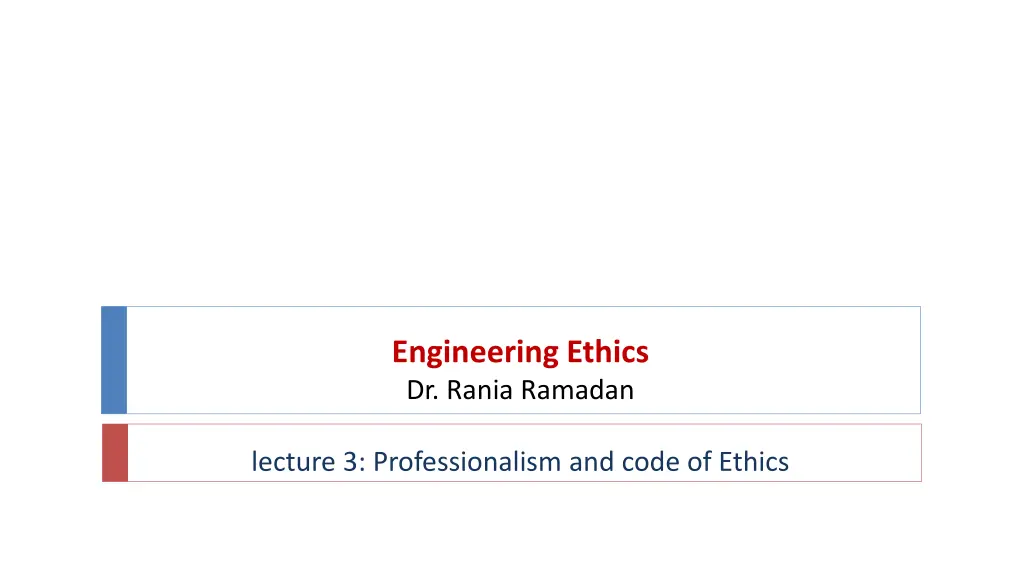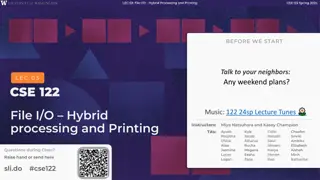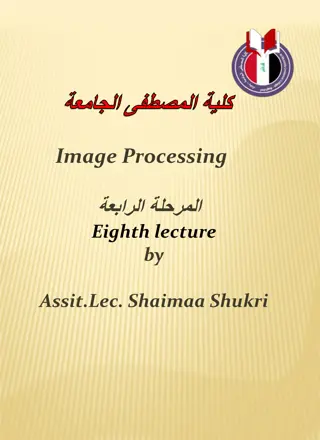
Engineering Ethics and Professionalism Overview
Explore the nature of professions, engineering codes of ethics, importance of following professional codes, and ethical considerations in various engineering fields like Civil, Mechanical, Electrical, Software, and Industrial.
Download Presentation

Please find below an Image/Link to download the presentation.
The content on the website is provided AS IS for your information and personal use only. It may not be sold, licensed, or shared on other websites without obtaining consent from the author. If you encounter any issues during the download, it is possible that the publisher has removed the file from their server.
You are allowed to download the files provided on this website for personal or commercial use, subject to the condition that they are used lawfully. All files are the property of their respective owners.
The content on the website is provided AS IS for your information and personal use only. It may not be sold, licensed, or shared on other websites without obtaining consent from the author.
E N D
Presentation Transcript
Engineering Ethics Dr. Rania Ramadan lecture 3: Professionalism and code of Ethics
Goal In this chapter, the nature of professions will be examined with the goal of determining whether engineering is a profession. Representation of engineering codes of ethics will be looked at in detail. At the end of this chapter, the Pentium case is presented in more detail along with two other cases . 2 Engineering Ethics lecture 3
What is a profession ? 1. Work that requires sophisticated skills, the use of judgment, and the exercise of discretion. Also, the work is not routine and is not capable of being mechanized. 2. Membership in the profession requires extensive formal education, not simply practical training . 3. The public allows special societies or organizations that are controlled by members of the profession to set standards for admission to the profession, to set standards of conduct for members, and to enforce these standards. 4. Significant public good results from the practice of the profession 3 Engineering Ethics lecture 3
Codes of Ethics Set by professional societies. To define rights, duties, and obligations A code of ethics is: A framework for ethical judgment. Commitment to ethical behavior shared by members of a profession. The roles and responsibilities of professionals A code of ethics is NOT: A legal document. Source of new moral or ethical principles. 4 Engineering Ethics lecture 3
Engineering Code of Ethics Some professional organizations have addressed the complexity of moral issues in their fields by developing codes of ethics Professional codes of ethics consist primarily of principles of responsibility that determine how to promote the public good. 5 Engineering Ethics lecture 3
Ethics in Engineering There are many fields of engineering, such as Civil Mechanical Electrical Software Industrial However, there are many ethical issues that arise across all of these fields of engineering. The code of ethics for engineers pertains to engineers of all kinds. 6 Engineering Ethics lecture 3
Clicker Question Engineers should follow their professional code of ethics because: The public will trust engineers more if they know engineers have a code of ethics. It helps them avoid legal problems, such as getting sued. It provides a clear definition of what the public has a right to expect from responsible engineers. It raises the image of the profession and hence gets engineers more pay. 1. 2. 3. 4. 7 Engineering Ethics lecture 3
The Engineering Code of Ethics The Engineering Code of Ethics has three components: The Fundamental Canons: which articulate the basic components of ethical engineering. The Rules of Practice: which clarify and specify in detail the fundamental canons of ethics in engineering. Professional Obligations: which elaborate the obligations that engineers have. 8 Engineering Ethics lecture 3
IEEE: Institute of Electrical and Electronics Engineers IEEE code of Ethics We, the members of the IEEE, in recognition of the importance of our technologies in affecting the quality of life throughout the world, and in accepting a personal obligation to our profession, its members, and the communities we serve, do hereby commit ourselves to the highest ethical and professional conduct and agree: to hold paramount the safety, health, and welfare of the public, to strive to comply with ethical design and sustainable development practices, and to disclose promptly factors that might endanger the public or the environment; to avoid real or perceived conflicts of interest whenever possible, and to disclose them to affected parties when they do exist; to be honest and realistic in stating claims or estimates based on available data; to reject bribery in all its forms; to improve the understanding by individuals and society of the capabilities and societal implications of conventional and emerging technologies, including intelligent systems; 1. 2. 3. 4. 5. 9 Engineering Ethics lecture 3
IEEE: Institute of Electrical and Electronics Engineers IEEE code of Ethics We, the members of the IEEE, in recognition of the importance of our technologies in affecting the quality of life throughout the world, and in accepting a personal obligation to our profession, its members, and the communities we serve, do hereby commit ourselves to the highest ethical and professional conduct and agree: to maintain and improve our technical competence and to undertake technological tasks for others only if qualified by training or experience, or after full disclosure of pertinent limitations; to seek, accept, and offer honest criticism of technical work, to acknowledge and correct errors, and to credit properly the contributions of others; to treat fairly all persons and to not engage in acts of discrimination based on race, religion, gender, disability, age, national origin, sexual orientation, gender identity, or gender expression; to avoid injuring others, their property, reputation, or employment by false or malicious action; 10. to assist colleagues and co-workers in their professional development and to support them in following this code of ethics. 6. 7. 8. 9. 10 Engineering Ethics lecture 3
Try it yourself You are supervising a product with specifications that only U.S.-made parts may be used. Late in the project you discover a sub-contractor has supplied a part with foreign- made bolts. They aren t very noticeable and would function identically to U.S.-made bolts. Your customer urgently needs the finished product. What should you do? 11 Engineering Ethics lecture 3
Try it yourself (cont.) Should you: A. Say nothing and deliver the product with the foreign bolts because the customer won t notice. B. Find some roughly equivalent violation of the contract/specs for which the customer is responsible and tell them you will ignore their violation if they ignore yours. C. Tell the customer about the problem and let them decide what you should do next. D. Find loopholes in the original specifications so that your company hasn t legally violated the specs. 12 Engineering Ethics lecture 3
Try it yourself (cont.) C (tell the customer) is the correct answer because it lets the customer decide what is in their best interest given new information. This may be tough, because your job may be on the line and your company s reputation may be at stake. Avoid deceptive acts Act for each employer or client as faithful agents or trustees 13 Engineering Ethics lecture 3
Pentium Case In 1994 95, it was discovered and widely reported that the latest version of the Intel Pentium chip had flaws. What course of action could Intel have taken to satisfy their customers and minimize the negative publicity they received? 14 Engineering Ethics lecture 3
Question What do you think: In the literature that comes with a product a manufacturer places a warning such as This product may contain unexpected flaws and might not operate correctly under all conditions. Does this solve the ethical problems for the company? A. Yes B. Sort of No C. 15 Engineering Ethics lecture 3
Pentium Case (cont.) At first, Intel sought to hide this information, but later came around to a policy of offering consumers chips in which the flaw had been corrected. 16 Engineering Ethics lecture 3
Book chapter 2 pages from 28 to 33 Case Studies The Intel Pentium chip, 1994. Runway Concrete of the Denver International Airline , 1990. Competitive Bidding and the Paradyne Case, 1980. 17 Engineering Ethics lecture 3



![Lec [2] Health promotion](/thumb/274962/lec-2-health-promotion-powerpoint-ppt-presentation.jpg)
